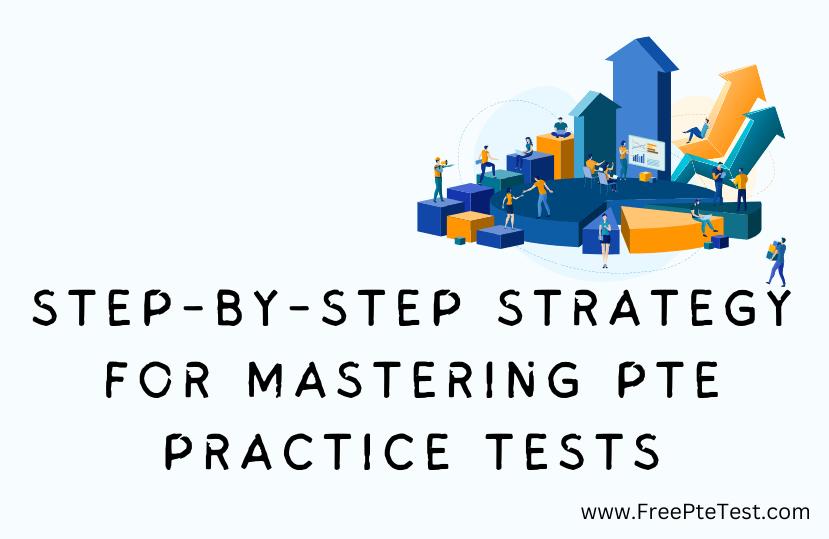Mastering PTE Practice Tests: A PTE mock test is a practice version of the real Pearson Test of English (PTE) exam that helps candidates prepare for the actual test. Here are the key points about PTE mock tests:
Purpose of PTE Practice Tests
- PTE mock tests serve as excellent self-assessment tools to gauge your current proficiency level in each PTE skill area: speaking, writing, reading, and listening.
- They help identify strengths and weaknesses to create a targeted study plan.
- Mock tests provide an opportunity to practice time management and build familiarity with the test format.
Format and Content
- PTE mock tests closely replicate the format and content of the real PTE exam, including the same types of questions and time constraints.
- They include all the sections found in the actual test: Speaking, Writing, Reading, and Listening.
Accessing PTE Mock Tests
- Mock tests for PTE preparation are available through various online platforms, test prep providers, and PTE preparation materials.
- Websites that offer realistic experiences, instant feedback, and detailed preparation materials are good sources for PTE mock tests.
- Consistent practice with mock tests can enhance your PTE score by identifying areas for improvement and allowing you to focus your study efforts.
- Mock tests provide a realistic test-taking experience, helping you build confidence for the actual exam.
- Detailed feedback on each task type helps improve your skills.
The number of mock tests depends on your individual progress and confidence level, but taking several in the weeks leading up to the exam is advisable. You can succeed in the real PTE exam with the right approach and consistent practice using PTE mock tests.
Why PTE practice tests are helpful
PTE practice tests are essential for candidates preparing for the Pearson Test of English (PTE) as they offer numerous benefits across different PTE assessments. Here are the key advantages:
- Understanding Test Structure: PTE practice tests simulate the actual exam format, helping candidates become familiar with the structure, sections, and question types. This familiarity alleviates anxiety and enhances self-assurance on the day of the examination.
- Identifying Strengths and Weaknesses: Regularly taking practice tests allows candidates to assess their English proficiency levels. This helps identify areas that need improvement, enabling a more focused study plan.
- Developing Pacing Skills: Since the PTE exam is time-bound, practice tests help candidates develop effective time management skills. They learn to allocate their time wisely across different sections, ensuring they can complete all questions without feeling rushed.
- Simulating the Actual Exam Environment: To maximize effectiveness, candidates should take practice tests under conditions that mimic the real exam. This includes sitting in a quiet place, adhering to strict time limits, and mentally preparing for the test.
- Quick Results and Performance Review: Many online platforms provide instant scoring and feedback after completing practice tests. This allows candidates to quickly identify mistakes and understand improvement areas, facilitating targeted learning.
- Exposure to Unique Questions: Each practice test typically offers a new set of questions covering various topics and skills. This diversity helps reinforce learning and ensures comprehensive preparation across all areas of the syllabus.
- Practicing Test-Taking Strategies: Mock tests are not only for skill assessment but also for practicing different strategies to tackle various question types effectively. Candidates can experiment with techniques like skimming and scanning or prioritizing questions based on difficulty.
- Learning from Examples: Many practice test platforms provide model answers or explanations for questions. Candidates can study these to improve their writing and speaking skills by understanding the expected response formats and language use.
PTE practice tests are invaluable for comprehensive preparation, offering a realistic experience that enhances confidence, skill assessment, time management, and strategic test-taking abilities. By integrating these mock tests into their study routine, candidates can significantly improve their chances of achieving desired scores on the actual PTE exam.
How PTE Practice Tests Help in PTE Exams
PTE practice tests are invaluable resources that significantly enhance performance across various PTE exam types. Here’s how they help in different PTE tests:
- PTE Academic
- Familiarization with Exam Format: PTE Academic practice tests closely replicate the actual exam structure, sections, and question types. Consistent practice helps you become comfortable with the PTE Test Format, reducing anxiety on exam day.
- Skill Assessment: Practice tests can help you assess your proficiency levels in listening, reading, writing, and speaking. This allows you to identify strengths and weaknesses and create a targeted study plan.
- Time Management Practice: PTE Academic is a timed exam, so practice tests enable you to develop effective time management skills. You learn to pace yourself and allocate time wisely across sections.
- PTE General
- Comprehensive Language Practice: PTE General practice tests cover various topics and language functions. Practicing with diverse content helps improve your overall English proficiency.
- Confidence Building: Consistent practice with PTE General mock tests boosts your confidence in using English for everyday communication, social interaction, and professional purposes.
- Feedback and Improvement: Practice tests provide detailed feedback on your performance, allowing you to track progress and focus on areas needing improvement.
- PTE Young Learners
- Age-Appropriate Content: PTE Young Learners practice tests feature content and tasks tailored to the age and level of the test-takers. This ensures relevant and engaging practice.
- Skill Development: Regular practice helps young learners develop their English language skills in a fun and interactive way, making learning more enjoyable.
- Parental Involvement: Parents can use practice tests to monitor their child’s progress and provide support where needed, ensuring a collaborative learning experience.
- PTE Essentials
- Targeted Skill Practice: PTE Essentials practice tests focus on specific language skills, such as speaking or writing. This targeted practice helps refine and polish these skills.
- Personalized Learning: Based on your performance in practice tests, you can create a personalized learning plan to address weaknesses and reinforce strengths.
- Exam Readiness: Consistent practice with PTE Essentials mock tests helps you assess your readiness for the actual exam and make necessary adjustments to your preparation.
PTE practice tests are versatile tools that can be adapted to suit the needs of different exam types. By incorporating practice tests into your preparation, you can enhance your language skills, boost your confidence, and increase your chances of success in the PTE exam of your choice.
Benefits of Practice Tests for Test Takers
Practice tests offer numerous advantages for test-takers preparing for exams. Here are some of the key benefits:
- Familiarity with Exam Format
Practice tests help candidates become familiar with the actual exam’s structure, sections, and question types. This familiarity alleviates anxiety and enhances self-assurance on the day of the examination.
- Skill Assessment and Targeted Practice
Practice tests allow candidates to assess their proficiency levels and identify strengths and weaknesses. This enables them to focus their study efforts on areas needing improvement.
- Time Management Practice
Since practice tests adhere to the same time constraints as the actual exam, they help candidates develop effective time management skills. Candidates acquire the ability to effectively distribute their time among various sections.
- Confidence Building
Regular practice with mock tests instills confidence in candidates. As they become accustomed to the question types and formats, they approach the actual test with enhanced self-assurance.
- Reinforcement of Learning
Practice tests encourage active learning by requiring candidates to retrieve and apply information. This process strengthens neural pathways and improves long-term retention of the learned material.
- Stress Reduction
Practice tests help reduce test-related stress and anxiety by simulating the exam environment. Candidates become more comfortable with the testing process, leading to increased ease and composure on the actual test day.
- Improved Performance
Research suggests that candidates who regularly take practice tests often achieve higher scores on the final exam. This is attributed to their ability to address weaknesses and enhance comprehension of the subject matter before the test.
In summary, practice tests are invaluable tools that help test-takers familiarize themselves with athe exam format, assess their skills, manage time effectively, build confidence, reinforce learning, reduce stress, and ultimately improve their performance on the actual exam.



